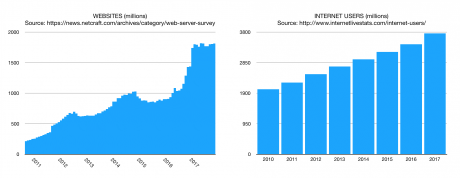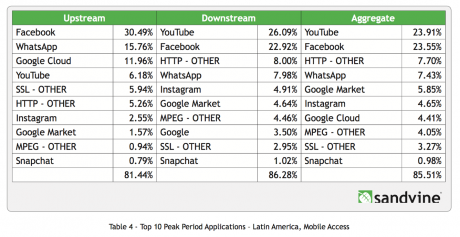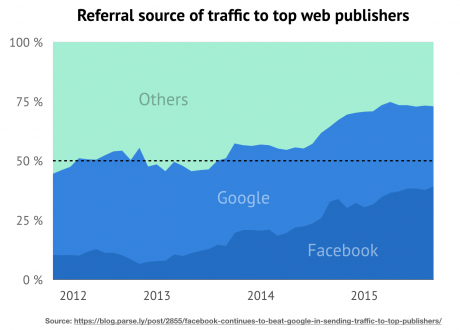The Internet has changed considerably since 2014, and not in a good way.
Yves here. 2014 was the year Google launched a change in its search algorithm called Panda. It treated sites that did aggregation (even if only as part of its content, as in our daily Links feature) as junk site scrapers and downgraded them in a big way in search rankings. Needless to say, sites that do aggregation well compete with Google’s search function, which was crapified by then, and in our case, Google News. Our total traffic fell by 1/3.
Note in the third chart how much traffic major media sites get from Google and Facebook combined. By contrast, Naked Capitalism gets <15% of its traffic from both sources. While this guarantees our independence, it costs us greatly in terms of revenues and influence. By André Staltz, who works as an independent contractor, programming instructor, speaker, and donation-based open source developer. From 2013 to 2017 he worked as a Senior Web and Mobile Developer at Futurice. Prior to that, he worked on his own startup building web discussion forum software. Originally published at saltz.com
It may seem as though nothing has changed on the web – but since 2014, Google and Facebook hace acquired direct influence over more than 70% of internet traffic. They’re not stopping there.
Before the year 2014, there were many people using Google, Facebook, and Amazon. Today, there are still many people using services from those three tech giants (respectively, Google (GOOG), Facebook (FB), Amazon (AMZN)). Not much has changed, and quite literally the user interface and features on those sites has remained mostly untouched. However, the underlying dynamics of power on the web have drastically changed, and those three companies are at the center of a fundamental transformation of the web.
It looks like nothing changed since 2014, but GOOG and FB now have direct influence over 70%+ of internet traffic.
Internet activity itself hasn’t slowed down. It maintains a steady growth, both in the amount of users and amount of websites:

(Sources: https://news.netcraft.com/archives/category/web-server-survey and http://www.internetlivestats.com/internet-users/)
What has changed over the last 4 years is market share of traffic on the web. It looks like nothing has changed, but GOOG and FB now have direct influence over 70%+ of internet traffic. Mobile internet traffic is now the majority of traffic worldwide and, in Latin America alone, GOOG and FB services had 60% of mobile traffic in 2015, growing to 70% by the end of 2016. The remaining 30% of traffic is shared among all other mobile apps and websites. Mobile devices are primarily used for accessing GOOG and FB networks.

The press, unlike before, depends on GOOG-FB to stay in business.
Another demonstration of GOOG and FB dominance can be seen among media websites. The most popular web properties that don’t belong to GOOG nor FB are usually from the press. For instance, in the USA there are 6 media sites in the top 10 websites; in Brazil there are 6 media sites in the top 10; in UK it is 5 out 10.
From where do media sites get their traffic? Prior to 2014, Search Engine Optimization (SEO) was a common practice among web developers to improve their site for Google searches, since it accounted for approximately 35% of traffic, while more than 50% of traffic came from various other places on the Web. SEO was important, while Facebook presence was nice-to-have. Over the next 3 years, traffic from Facebook grew to be approximately 45%, surpassing the status that search traffic had. In 2017, the media depends on both Google and Facebook for page views, since it’s the majority of their traffic.

The relationship between media sites and the two tech giants is difficult. In 2014, FB built Facebook Paper as an attempt to have a larger control over news consumption. Their tactic failed, but their strategy persisted through different means such as Facebook Instant Articles. The media, being dependent on social traffic and threatened by the social behemoth, reacted. They pulled out support for Instant Articles.
Meanwhile, GOOG notices how its search traffic hadn’t improved, while Facebook had picked up steam, so GOOG launches their Instant Articles alternative called Accelerated Mobile Pages (AMP) and proactively starts serving articles from GOOG servers instead of directing traffic to media sites. The press reacts similarly to how they did for FB: reported bold stories about the search behemoth’s thirst for control over news consumption.
GOOG and FB ceased competing directly, focusing on what they do best instead.
Data shows FB has dramatically improved its dominance on the web, while Google search hasn’t significantly changed. How exactly did FB achieve that, and what events were key to that development? Prior to 2014, both companies had a portfolio of multiple web services. GOOG hadn’t yet become Alphabet, so its focus was diffused. GOOG was trying to enter the social market, first with Google Wave, then Google Buzz, Orkut, and Google+. In total, GOOG has acquired 18 companies from the social media category, of which only 1 acquisition happened post-2014, while 5 of those happened in 2010 alone. FB was competing in the search market, through Bing, in partnership with Microsoft (MSFT).
During 2014, FB apparently reorganized itself to focus on social only. In February, it bought WhatsApp, for 11 times the price GOOG bought YouTube. In December, it canceled its Bing partnership with MSFT. User retention on Facebook.com grew steadily (see chart below). Through its four simple products, Facebook, WhatsApp, Messenger, and Instagram, FB had become the social superpower...
Similarly, GOOG in 2014 started reorganizing itself to focus on artificial intelligence only. In January 2014, GOOG bought DeepMind, and in September they shut down Orkut (one of their few social products which had momentary success in some countries) forever. The Alphabet Inc restructuring was announced in August 2015 but it likely took many months of meetings and bureaucracy. The restructuring was important to focus the web-oriented departments at GOOG towards a simple mission. GOOG sees no future in the simple search market, and announces to be migrating “From Search to Suggest” (in Eric Schmidt’s own words) and being an “AI first company” (in Sundar Pichai’s own words). GOOG is currently slightly behind FB in terms of how fast it is growing its dominance of the web, but due to their technical expertise, vast budget, influence and vision, in the longrun its AI assets will play a massive role on the internet. They know what they are doing.
These are no longer the same companies as 4 years ago. GOOG is no longer an internet company, it’s the knowledge internet company. FB is not an internet company, it’s the social internet company. They used to attempt to compete, and this competition kept the internet market diverse. Today, however, they seem mostly satisfied with their orthogonal dominance of parts of the web, and we are losing diversity of choices. Which leads us to another part of the internet: e-commerce and AMZN.
AMZN does not focus on making profit...
sn’t GOOG trying to guarantee the open web stays alive? Not necessarily. GOOG’s goal is to gather as much rich data as possible, and build AI. Their mission is to have an AI provide timely and personalized information to us, not specifically to have websites provide information. Any GOOG concerted efforts are aligned to the AI mission.
Mobile usage is on the rise – having already crossed desktop as the primary channel for internet usage – and native mobile apps are so far the best way of providing good user experience on mobile. GOOG collects little or no data from native mobile apps, to some extent on Android, but specially on iOS. PWAs happen to live in the neutral and open web, and are better suited for data collection while providing great user experience on mobile...
GOOG, MSFT, FB, and AMZN are mimicking (Apple) AAPL’s strategy of building brand loyalty around high-end devices. Through a process I call “Appleification”, they are (1) setting up walled gardens, (2) becoming hardware companies, and (3) marketing the design while designing for the market. It is a threat to AAPL itself, because they are behind the other giants when it comes to big data collection and its uses. While AAPL’s early and bold introduction of an App Store shook the web as the dominant software distribution platform, it wasn’t enough to replace it. The next wave of walled gardens might look different: less noticeable, but nonetheless disruptive to the web.
There is a tendency at GOOG-FB-AMZN to bypass the web, which is motivated by user experience and efficient communication, not by an agenda to avoid browsers. In the knowledge internet and the commerce internet, being efficient to provide what users want is the goal. In the social internet, the goal is to provide an efficient channel for communication between people. This explains FB’s 10-year strategy with Augmented Reality (AR) and Virtual Reality (VR) as the next medium for social interactions through the internet. This strategy would also bypass the Web, proving how more natural social AR would be than social real-time texting in browsers. Already today, most people on the internet communicate with other people via a mobile app, not via a browser.
The common pattern among these three internet giants is to grow beyond browsers, creating new virtual contexts where data is created and shared. The web may die like most other technologies do: simply by becoming less attractive than newer technologies. And like most obsolete technologies, they don’t suddenly disappear, neither do they disappear completely. You can still buy a Walkman and listen to a tape with it, but the technology has nevertheless lost its collective relevance. The web’s death will come as a gradual decay of its necessity, not as a dramatic loss...
Perhaps a future with great user experience in AR, VR, hands-free commerce and knowledge sharing could evoke an optimistic perspective for what these tech giants are building. But 25 years of the Web has gotten us used to foundational freedoms that we take for granted. We forget how useful it has been to remain anonymous and control what we share, or how easy it was to start an internet startup with its own independent servers operating with the same rights GOOG servers have. On the Trinet, if you are permanently banned from GOOG or FB, you would have no alternative. You could even be restricted from creating a new account. As private businesses, GOOG, FB, and AMZN don’t need to guarantee you access to their networks. You do not have a legal right to an account in their servers, and as societies we aren’t demanding for these rights as vehemently as we could, to counter the strategies that tech giants are putting forward.
The web and the internet have represented freedom: efficient and unsupervised exchange of information between people of all nations. In the Trinet, we will have even more vivid exchange of information between people, but we will sacrifice freedom. Many of us will wake up to the tragedy of this tradeoff only once it is reality.
https://www.nakedcapitalism.com/2017/11/web-began-dying-2014-heres.html
No comments:
Post a Comment